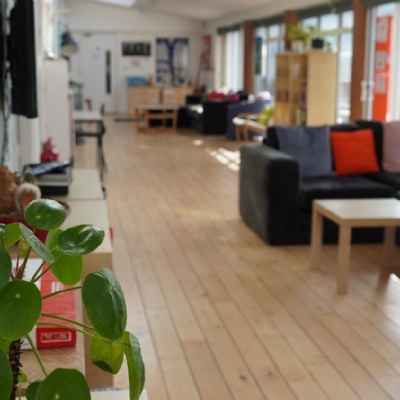Supporting Growth Beyond the Classroom

At Moor House, student success doesn’t stop when the school or college day ends, and much of that is thanks to the passionate and dedicated Residential Care Team.
Having first joined Moor House in 2010 as a Specialist Teaching Assistant (STA), Polly Harrison’s journey has been one of continual growth. After progressing to Senior STA, later re-titled to Learning Support Team Leader, she managed a team of over 20 staff, before making the transition to College Residential Team Leader in 2024.
It wasn’t an easy decision, but one that was inspired by the students themselves.
“I started doing some bank shifts just to help out when they were short-staffed,” Polly recalls. “But I really loved it. It was actually the students who said, ‘You’re really good at this, why don’t you come and work here?’ That was a lovely compliment, and it felt like the right time for a change.”
Student-Centred Support
With a background in education, Polly brought a deep understanding of each student’s learning style, communication needs, and challenges. But in residential care, she found a different, more holistic way to support them.
“In the classroom, you get to know how they learn. Over here, you get to know who they are. You see them relaxing, working on life skills, developing independence. It’s a different side, and it’s such a privilege.”
This dual perspective allows Polly and her team to tailor support in meaningful ways. Whether it’s creating visual recipes for cooking, helping students organise their rooms, or working on essential life skills like budgeting or laundry, the Residential Team support these tasks in a way that encourages growth, and celebrates progress.
More Than a Job
Polly’s schedule is far from typical. Early starts begin at 7am, while late shifts often involve staying overnight, and no two days are quite the same. But, as she says, “the time passes quickly because you’re having so much fun with the students.”
The team organises everything from baking for the on-site student run coffee shop, to trips out in the local village, building confidence in travel, money handling, and social interaction. Upcoming outings include a pantomime, Tobogganing in Chatham, and even a West End showing of Hamilton.
“Some of these are things the students might do at home too, but here we’re creating a homely environment with structured opportunities. We want them to experience joy, while developing key life skills.”
A Team Effort
At the heart of the residential model is a strong emphasis on collaboration. Weekly meetings bring together teaching staff, speech and language therapists and occupational therapists to discuss each student’s progress. This integrated approach ensures consistent, wraparound care.
“If a student’s struggling in one area, we work together to problem-solve. We contribute to annual review reports, help set and track goals, and provide feedback to make sure every part of their development is supported.”
The role comes with its challenges, not least the complexity of some students' needs, which occasionally require external expertise that isn’t always readily available. But the rewards far outweigh the obstacles.
Moments That Matter
Polly recalls a memorable moment which proved a breakthrough for a student known for her anxiety and perfectionism.
“She was baking brownies for the coffee shop, and they all slid off the tray, straight onto her brand-new white trainers. I thought she’d be devastated, but instead she just smiled and said, ‘Would anyone like to lick my shoe?’ It was such a beautiful moment of humour and resilience, a real turning point for her.”
Growing in Confidence — Together
The benefits of residential life go far beyond basic care. It’s about fostering independence, building social communication, and creating space for students to make mistakes, and learn from them, in a supportive environment.
“It’s really hard as a parent to let go,” Polly says, “but our team is brilliant. We scaffold their learning, and we know when to step back and let them grow. Watching them thrive, seeing that transformation, it’s what makes the job so special.”
And when the time comes for students to leave, the whole team shares in the pride.
“We see them stand up in their leavers’ assemblies and talk about everything they’ve overcome. It’s beautiful. You feel proud of them, proud of yourself, and proud to be part of such a caring and committed community.”




